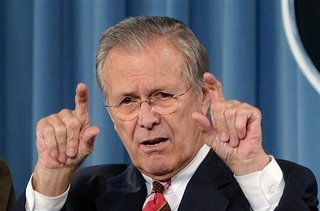Tuesday, June 20, 2006
Rumsfeld Questioned In Boeing Tanker Lease Probe

Defense Secretary Donald Rumsfeld was questioned by investigators from the Pentagon's inspector general's office in 2005 about his knowledge of the tanker lease scandal that sent a DOD official and a Boeing employee to prison.
Rumsfeld did not come across as the highly competent manager that he tries to portray publicly.
Rumsfeld cited poor memory, loose office procedures, and a general distraction with "the wars" in Iraq and Afghanistan to explain why he was unsure how his department came to nearly squander $30 billion leasing several hundred new tanker aircraft that its own experts had decided were not needed...
The Air Force in 2004 canceled its plan to lease the tankers from the Boeing Co., amid allegations of improper collusion with the company. Former Air Force procurement officer Darleen A. Druyun and one of the interlocutors at Boeing were sent to prison; subsequent investigations showed that Druyun manipulated other large Air Force contracts to benefit military contractors.
After a Senate investigation unearthed evidence that the tanker purchase was viewed inside the Pentagon as a politically tinged bailout for Boeing, Air Force Secretary James G. Roche and his top acquisitions deputy resigned from government. Boeing's chief executive was replaced, and last month the firm agreed to pay $615 million to settle all liability for the tanker scandal and an unrelated impropriety. It was the largest penalty paid by a defense contractor...
Rumsfeld is a former business executive and White House official who published a set of "Rumsfeld's Rules" that include the injunction: "Be precise -- a lack of precision is dangerous." But when investigators asked him whether he had approved the Boeing tanker lease in May 2003 -- despite widespread violations of Pentagon and government-wide procurement rules along the way -- Rumsfeld said: "I don't remember approving it. But I certainly don't remember not approving it, if you will."
Asked whether his subordinates, including former undersecretary of defense Edward C. "Pete" Aldridge, had accurately invoked Rumsfeld's approval when they signed documents authorizing the Boeing tanker lease to go forward, Rumsfeld said, "I may very well have said yes. I just don't remember. . . . I am not going to sit here and quibble over it." He did say he remembered approving a gun for a tank in 1976, during his first time as defense secretary.
When pressed about the tanker lease -- the largest such lease in U.S. history -- Rumsfeld offered two explanations for his distance from it. The first was related to his focus on what he called "the global war on terror," including the wars in Afghanistan and Iraq, and what he termed the "continuing difficulties" with the Taliban and al-Qaeda...
Asked if he was aware of concerns about the proposed Air Force lease from Capitol Hill and the Pentagon's own analysts, Rumsfeld responded, "I don't know what I knew then, compared to what I know now. . . . I am not able to go back and say . . . what did I know at a certain moment back in that period."...
The investigators tried a different tack. Tell us, one said, about the extent and nature of conversations with the White House about the tanker lease. The question related to the fact that in 2002 President Bush asked then-White House Chief of Staff Andrew H. Card Jr. to help reach a deal between the Pentagon and Boeing, which had substantial clout on Capitol Hill and was a major contributor to Bush's inaugural celebration.
"I have been told," Rumsfeld said, "that discussions with the president are privileged, and with his immediate staff." Large portions of text on the next five pages of the 38-page interview transcript were blacked out in the copy provided to The Post...
(I)n the past six years, while Rumsfeld occasionally mentioned procurement problems in his public appearances, he delivered only one major speech about the need for reform in how the Pentagon buys weapons. He complained in the speech that "our financial systems are decades old" and noted estimates that "we cannot track $2.3 trillion in transactions." He also said that the acquisition process was being improved and that "we now budget based on realistic estimates."
Rumsfeld's speech was delivered on Sept. 10, 2001.
There are no such things as coincidences.


